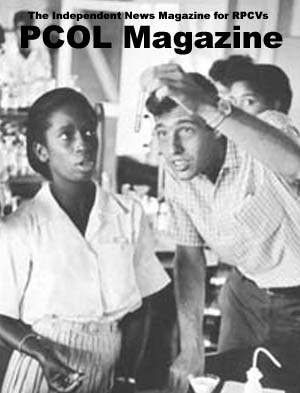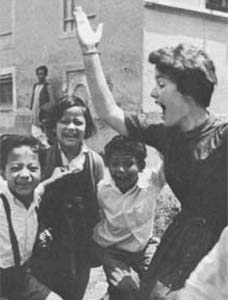
Needed: a medical peace corps - President Bush should expand the Peace Corps to encompass newly credentialed American physicians and health professionals willing to do voluntary service abroad
Needed: a medical peace corps
By Robert I. Rotberg and Victoria I. Salinas | May 10, 2005
AS ANGOLANS die piteously of Marburg virus and Africans everywhere suffer from HIV/AIDS, malaria, tuberculosis, and a host of other killers, too little attention is paid to the desperate nature of Africa's routine health services. Just as most African governments provide too few doses of antiretroviral medicines to their HIV populations at risk, so most African nations are far too poor to afford more than the bare rudiments of medical care. The wealthy healthy world must do far more for Africa, where every statistic reveals how fundamentally neglected Africans are. An American medical peace corps would go a long way to alleviate Africa's fundamental training and skills shortage.
ADVERTISEMENT
Funding the delivery of medicines and vaccines and providing more antimalarial bed nets is absolutely important. What the United States and other donor nations are doing in this manner to help diminish the spread of HIV/AIDS, tuberculosis, and parasitical diseases like Leishmaniasis, schistosomiasis, and sleeping sickness is eminently laudable. But anyone concerned about the deplorable state of Africa's health services must do far more and understand the enormity of Africa's health deficit.
In 2002, the United States spent $5,274 on each American's healthcare, Canada $2,222, and France $2,348. Throughout Africa, governments and the private sector are spending less than $50 per person per year, on average. Even in South Africa, one of Sub-Saharan Africa's richest and best developed nations, only $206 is spent on health services from public and private coffers.
Or, to look at it another way, most African countries were able to spend only 2 percent of their total GDP on health provisions and hospitals. Canada spends 10 percent of its GDP, the United States 15 percent, on health and hospitals.
Even these immense disparities between the developed world and Africa, and between Africa's rich and poor countries, cannot display the size of Africa's health delivery problem. Take a simple measure like the number of citizens per physician. In Canada and Britain, each physician attends to 500 to 600 people. In the United States, one physician looks after 182. In Africa, each physician has, on average, 14,000 people. That number is even more alarming in Liberia, where each physician serves 43,000 persons. in Malawi it is 36,000, and in Burkina Faso 26,000.
The number of hospital beds per 1,000 people is another reasonable measure. In the United States, Canada, and Britain there are about four beds for every 1,000. In Africa there is one bed for every 1,000 people.
Is there any wonder, given such stark statistics, that Marburg fever quickly overwhelms Angola's medical system and that the delivery of antiretroviral medicines (if and when available) can hardly be administered throughout most of Africa's territories? Given the paucity of treatment facilities and the woeful absence of fully trained medical personnel (local or foreign) on the ground in Africa, is it not obvious what the world's richer countries and peoples should now do both out of moral responsibility and in order to protect their own ultimate security? Diseases, after all, do spread from easily. With air and other forms of travel, great distances cannot prevent contagion.
Life expectancy in the developed world averages over 60; well into the 70s in the United States and even the 80s in Japan. In Africa, largely because of HIV/AIDS, but also because of everything else, life expectancies have plummeted into the 30s (Malawi, Sierra Leone, Zambia, and Zimbabwe) and 40s (Angola, Kenya, Mozambique, Namibia, Uganda, and South Africa), and approach developed world levels only in prosperous Seychelles and Mauritius, two Indian Ocean islands.
Infant mortality levels in the world rise from a laudable low in Finland and Denmark of 3 infants per 1,000 born to 7 infant deaths per 1,000 in the United States. But in Africa more than 150 babies out of every 1,000 are dying in Angola, Niger, and Sierra Leone. Africa's median level is 95.
The United States and other donors should continue to assist Africa to eradicate disease, improve potable water and sanitation, and undertake critical research leading to new cures. But we as Americans should also provide new funds on a sustainable basis to build and maintain clinics and hospitals, to train more local physicians at African and foreign universities, and to expand a local corps of physician assistants or nurse practitioners. Most of all, President Bush should expand the Peace Corps to encompass newly credentialed American physicians and health professionals willing to do voluntary service abroad. Uplifting humanity in that way could help alleviate Africa's medical delivery crisis and, once again in our national history, demonstrate that Americans do care for and will do something positive about the welfare of the world's least fortunate.
Robert I. Rotberg is director of the Kennedy School's Program on Intrastate Conflict and president of the World Peace Foundation. Victoria I. Salinas plans to receive a master's degree in public policy from Harvard University in June.









